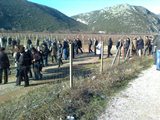The study visit was organized within the USAID-funded project “Capacity Building for Drought Adaptation in Agribusiness”, with the aim of introducing participants to examples of good practice in the region. About 100 subcontractors and members of the management of six partner cooperatives and representatives of municipalities from northeastern Bosnia participated in the study visit. On the first day, December 20, 2011, the group traveled in two buses, with a lunch break in Jablanica, and continued their journey to Dubrovnik, where they spent the night.
On the second day, December 21, 2011, the participants left early in the morning for Opuzen, where they visited the plants of Agrofructus d.o.o.
Agrofructus d.o.o. is a leading company specializing in the production, purchase and sale of fruits and vegetables in SE Europe. With an annual delivery of 190,000 tons of fruits and vegetables, production and purchase activities in Croatia, Macedonia, Serbia, and sales in 15 countries of Western and Eastern Europe, they achieve an annual turnover of over €100 million. Agrofructs owns seven large purchasing centers specializing in individual goods. The Opuzen shopping center is equipped throughout the year for the reception and preparation of various types of fruits and vegetables, and serves for the placement of 50,000 tons. Its spreads over 11,000 square meters of which 6,000 square meters is conditioned space and is equiped with a state-of-the-art mandarin calibrator with a processing capacity of 35 tons per hour. They annually place 25,000 tons of mandarins on the market, which represents 50% of the total domestic production, of which they export 18,000 tons. They are cooperating with about 850 subcontractors in the purchase of mandarins. The staff of Agrofructus took the participants of the visit on a tour of the plant and showed them the equipment and explained the methodology for ensuring the quality and traceability of products, as well as how they developed cooperation with subcontractors and how it works.
The visit then continued with a tour of the greenhouse owned by Mr.Bruno Volarević specializes in the production of seedlings, especially watermelons and melons, but he also grows lettuce and dill. The reason for visiting the greenhouse is the irrigation system that uses rainwater. Although there is plenty of water in the entire Neretva Valley, its quality is not good for irrigation. That is why Mr.Volarevic installed a rainwater harvesting system on the entire surface of the greenhouse; the rainwater is then stored in a galvanized sheet metal tank, which is lined with a geo-membrane (to prevent water losses). The irrigation system is built around that tank and is fully automated. Mr. Ivo Andrić from the company Granum d.o.o. Capljina, who also designed this irrigation system, was a guide at this and the next stage of the study visit.
Finally, the vineyards in Žitomislić and the associated irrigation system in Žitomislić owned by the company Hercegovinavino d.o.o. This irrigation system was also designed by Ivo Andrić from Granum.
Hercegovinavino d.o.o. is a private company founded in Mostar in 1994. The main activity is the production and trade of alcoholic and non-alcoholic beverages.
Hercegovinavino has a network of branches/distribution centers in all major cities of Bosnia and Herzegovina. Hercegovinavino doo Mostar is the majority shareholder and distributor of wine of Čitluk Winery dd Čitluk. Their products, primarily wines, can be found in the markets of many European countries, and more recently in the markets of the USA, Russia and China. Hercegovinavino owns over 300 ha of vineyards in Herzegovina. The irrigation system in Žitomislić covers about 70 ha of vineyards Žitomislići I and II, among which are the indigenous species Žilavka and Blatina, as well as table cultivars. For the needs of the irrigation system in Žitomislić, a drip irrigation system was built, equipped with two pumps of 32 kW each, and the water was obtained from a well from a depth of 8m.

